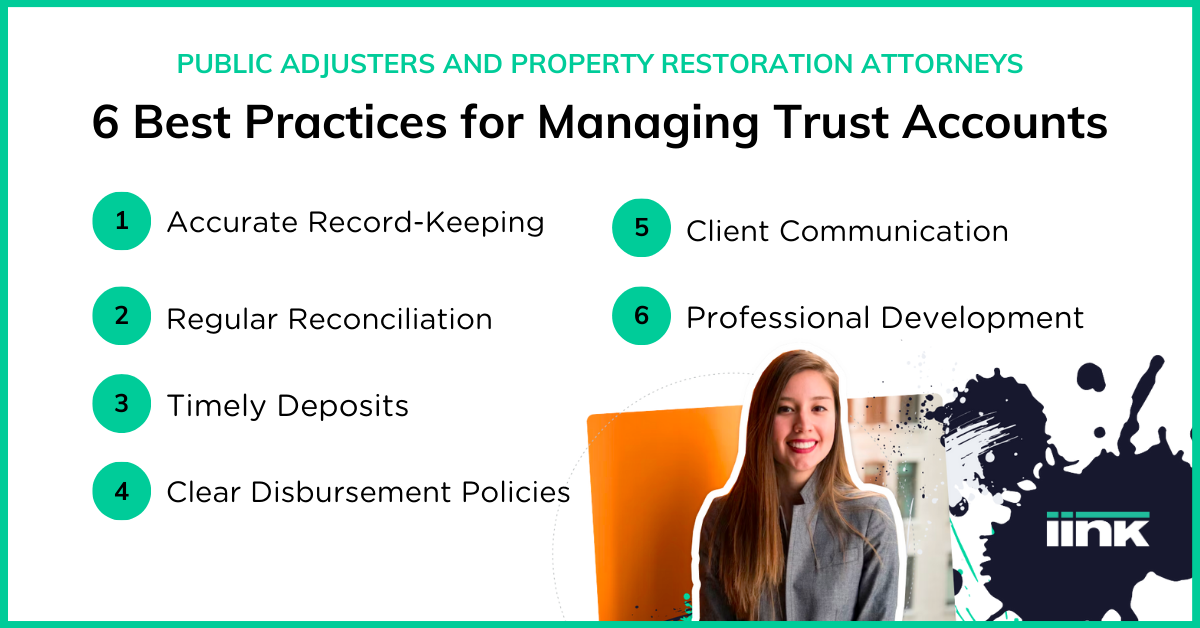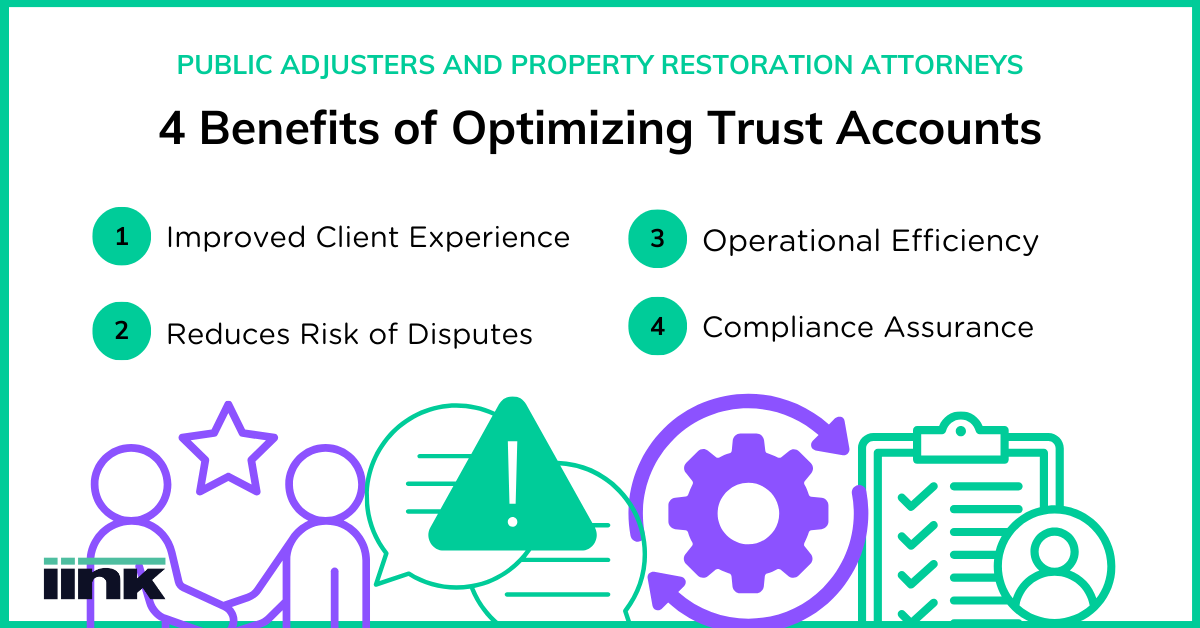As a public adjuster or property restoration attorney, you’re responsible for advocating on policyholders' behalf, ensuring they receive fair settlements for their insurance claims. Many businesses often overlook the management of trust accounts. These accounts are not just a regulatory requirement but crucial for maintaining trust with your clients and improving your business operations. This comprehensive guide will help to demystify trust accounts and offer practical advice. Plus, insight into digital tools to help make managing trust accounts a breeze.
Introduction to Understanding Trust Accounts
A trust account is a particular bank account where funds held on behalf of a client are kept separate from your business's operating funds. For public adjusters and property restoration attorneys, these funds typically include insurance settlement proceeds that you manage until they are disbursed to the policyholder or used to pay for repairs and other related expenses.
Why Trust Accounts Matter for Public Adjusters and Property Restoration Attorneys
Regulatory Compliance. Different states have specific regulations governing how public adjusters and property restoration attorneys handle client funds. Failing to comply can result in penalties, loss of license, and damage to your reputation. By maintaining a trust account, you adhere to these legal requirements, ensuring your practice operates within the bounds of the law.
Financial Integrity. Segregating client funds from your business funds prevents the commingling of monies, which can lead to accounting errors and potential disputes. This separation ensures transparency and builds trust with clients, who can see their funds managed responsibly.
Client Trust. Handling significant sums of money places great responsibility on shoulders. Clients need to be confident that their funds are safe and being used appropriately. Proper management of a trust account demonstrates professionalism and reinforces client trust.


6 Best Practices for Managing Trust Accounts
Managing trust accounts effectively requires adherence to best practices to ensure accuracy, transparency, and compliance. This section outlines essential practices that help you maintain high standards in trust account management.

- Accurate Record-Keeping. Maintain detailed records of all transactions involving the trust account, including deposits, withdrawals, and transfers. Use accounting software to help you track these transactions accurately and generate reports as needed.
- Regular Reconciliation. Reconcile your trust account regularly, ideally every month. This process involves comparing your records to the bank statement to ensure no discrepancies. Regular reconciliation helps you catch and correct errors promptly.
- Timely Deposits. Ensure all client funds are deposited into the trust account promptly. Delays in depositing funds can lead to issues with cash flow and compliance.
- Clear Disbursement Policies. Establish and communicate clear policies regarding the disbursement of funds from the trust account. Ensure that all disbursements are authorized and documented. This practice helps prevent unauthorized use of client funds and ensures all parties are on the same page.
- Client Communication. Keep your clients informed about the status of their funds. Regular updates on their claim progress and settlement status can alleviate concerns and reinforce their trust in your management.
- Professional Development. Stay informed about changes in regulations and best practices related to trust account management. Attend workshops, webinars, and other training opportunities to stay up-to-date with industry standards.
Leveraging Technology
To help manage trust accounts more efficiently, consider investing in a solution like iink Payments, specifically designed to help public adjusters and property restoration attorneys get paid on property damage insurance claims.
iink can significantly enhance trust account management for your business. With digital endorsements, you can streamline the payment process, reducing the time and effort required for manual transactions. Transaction transparency for all stakeholders ensures that every party involved has real-time visibility into the payment status, fostering trust and accountability. Additionally, mobile check uploads and digital endorsements simplify and expedite the deposit process, allowing for more efficient and accurate management of funds.
4 Benefits of Optimizing Trust Accounts
Optimizing trust accounts is helpful for enhancing both client satisfaction and operational efficiency. This section highlights the key benefits of managing trust accounts effectively, ensuring a seamless and professional experience for all stakeholders.

- Improved Client Experience. When clients see that their funds are handled professionally and transparently, their satisfaction with your services improves. Happy clients are also more likely to refer you to others, helping to grow your business.
- Reduces Risk of Disputes. Accurate and transparent management of trust accounts minimizes the risk of client disputes over financial matters. This reduces the likelihood of legal issues and helps maintain a positive reputation.
- Operational Efficiency. Streamlined trust account management processes save time and reduce administrative burdens. This efficiency allows you to focus more on your core responsibilities and less on financial management.
- Compliance Assurance. Adhering to best practices ensures you remain compliant with regulatory requirements, avoiding potential fines and other penalties.
Conclusion
Optimizing trust accounts is a regulatory necessity and a strategic advantage for public adjusters and property restoration attorneys. By implementing best practices and leveraging technology, you can ensure financial integrity, enhance client trust, and streamline your operations.Taking the time to manage trust accounts effectively will pay off in increased client satisfaction, reduced risk, and a more efficient business.
"Remember, trust is not just a part of the account name—it's the foundation of your relationship with your clients."


